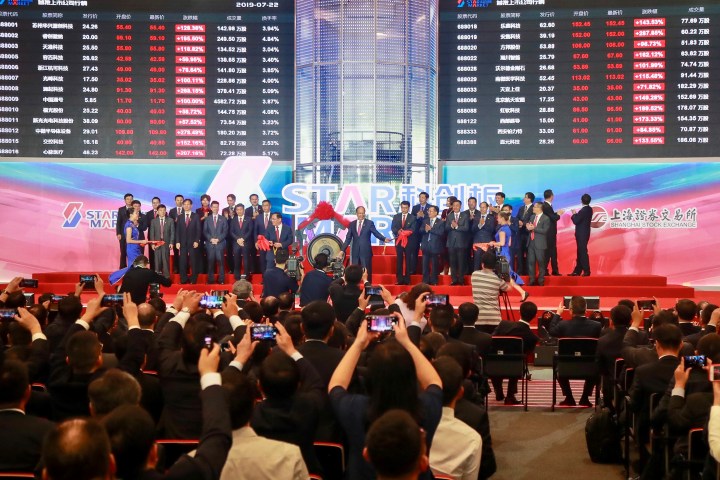
Shanghai Stock Exchange shoots for the STARs with new tech-focused board
Share Now on:
Shanghai Stock Exchange shoots for the STARs with new tech-focused board

As geopolitical tensions weigh on investor sentiment, from the U.S.-China trade war to growing unrest in the Persian Gulf, the Shanghai Stock Exchange on Monday launched an antidote of sorts: the STAR Market.
Modeled after the Nasdaq stock exchange in New York, STAR listed 25 Chinese science and technology companies. The board is the latest evidence of China’s continued focus on opening up its capital markets.
Beijing sees the platform, announced by President Xi Jinping in November, as a way to encourage more indigenous companies to list on domestic markets rather than take stock-market debuts to other countries like the United States.
There was solid demand for the shares on the first day of trade: The average gain for the newly listed companies was 140%, though individual names rose as much as 400%.
Art Karoonyavanich, the chief executive of DBS Asia Capital in Singapore, said looser regulations that follow international standards attracted companies to list on the new board. For example, the STAR Market doesn’t require firms to be profitable at the time of listing, nor does it cap first-day gains at 44%, like other companies listed on the Shanghai and Shenzhen stock exchanges.
Art Karoonyavanich: What they’re doing here is streamlining the process and opening it up. The average time for listing on China’s Asia market can take companies more than two years. While for the stock market, it can take just three months. This board also allows for companies which are still posting losses to list, which is a first in China. Trading rules have also been loosened to give market forces a bigger role in setting share prices.
Victoria Craig: Today we’ve seen 25 companies debut. Chinese President Xi Jinping, who announced the launch of this board in November, wanted to get more investors interested in homegrown Chinese tech companies. Will this board succeed in doing that? Do you think we’ll see more companies list in the future?
Karoonyavanich: Yeah, absolutely. The companies already listing are going through the process, they find it much more efficient to go through, so the backlog of deals will be lessened and more companies could be able to be listed onshore. Likewise, from an investor perspective, this gives them an alternative source of companies to invest in. You know, based on today’s market performance by midday, on average, the 25 companies that got listed were up 160%.
Craig: And, as you said, clearly there’s demand. But who’s buying? Is it more institutional investors or are we seeing mom-and-pop investors coming into this market?
Karoonyavanich: Well, I think it’s a combination. The first batch of 25 companies raised about 37 billion yuan which was almost 19% or 20% higher than originally planned. There was a huge amount of oversubscription from both institutional and retail investors.
Craig: Is it riskier for those mom-and-pop investors to get in this market at this point? Clearly these companies can’t sustain 500% gains.
Karoonyavanich: I would say that they’ve put at least some safeguards there. The [Shanghai Stock Exchange] requires a minimum asset 500,000 yuan for each of the retail accounts to qualify for this new tech board investment. So a lot of the smaller mom-and-pops wouldn’t be affected because they won’t qualify to be able to trade these stocks anyway.
Craig: There had been worries that this new board could siphon off demand for stocks on other exchanges today. We saw the Shanghai Composite and the CSI 300 decline. Will demand eventually even out between all of these investment opportunities, all these exchanges and boards?
Karoonyavanich: Absolutely. It’s really company-driven. I think it will be dependent on the type of merits of each of the investment opportunities to attract the type of investors. Again, this is a new board and there is a lot of excitement around it. Any IPO as you know in the China market trades relatively well [on] debut. They’ve all made money, effectively, during debut. So I think that because this is, you know, high profile, there’s a lot of publicity around it. There’s a large number of companies coming to trade following the oversubscription rates that you’ve had over the last couple of weeks. It’s set itself up to do very well. But in the long run, it becomes another company listed in markets in China and they have to trade based on merits of those companies.
There’s a lot happening in the world. Through it all, Marketplace is here for you.
You rely on Marketplace to break down the world’s events and tell you how it affects you in a fact-based, approachable way. We rely on your financial support to keep making that possible.
Your donation today powers the independent journalism that you rely on. For just $5/month, you can help sustain Marketplace so we can keep reporting on the things that matter to you.


















